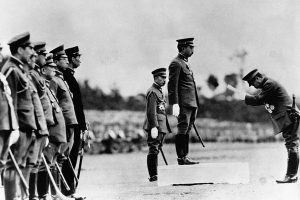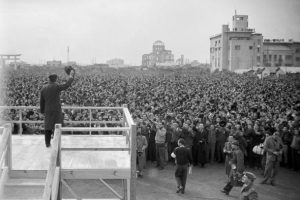■ US-Japan collaboration: "Pacifist Hirohito"
"Emperor Hirohito was a peace lover and he could have opposed the war of aggression, but he didn't know how to do it, nor did he have the power to stop it."
Paul Manning, an American reporter who stayed in Japan after the war in the early stages of the occupation and covered the whole country, said, "Despite this, I couldn't report on it due to the censorship of GHQ. " In the report "Emperor Showa as seen by US war correspondents," "it was not only the Japanese people but also the American citizens who were cut off from the facts," criticizing the US occupation policy.

[Photo] Emperor Showa, who conducted a military parade in 1940, when the 2600th anniversary of the imperial era was celebrated.
■ Emperor Hirohito, who held great power in both name and reality
As mentioned above, scholars say, "The Emperor (who was a constitutional monarch under the Imperial Constitution) had no veto power over the Cabinet's military decision and automatically approved it." This is the most unmissable interpretation for intentional misleading. Article 6 of the Constitution of the Emperor of Japan stipulates that "the emperor's law can be promulgated and enforced (the emperor approves the law and orders its promulgation and enforcement)". Therefore, if the emperor disapproves the law, it is the exercise of the emperor's veto power against the parliament. There was a veto, but it has never been exercised. The reason why it was not exercised is that the Cabinet generally explained its policy to the Emperor in advance and decided with the Emperor's will absolutely prioritized, so it was all approved. At least for Emperor Showa, the Minister of State's condolences (advice) became a formal ritual pretending to be a constitutional monarch.
Certainly, the emperor of the Meiji era was a puppet of the elders who were the meritors of the Meiji Restoration who led the Meiji oligarchy government. However, Emperor Hirohito and his aide, Kyuchu Group, who became regent in November 1921 in place of Emperor Taisho, who was ill and had problems with his working ability, became the regent in December 1926. I was shaken by the execution of the world family. The progress of party politics centered on the Imperial Diet, which can be said to be the aftermath of the revolution, that is, the small inclination toward democratization of Japanese society called "Taisho democracy" has been cut off from the roots, and the military and bureaucratic groups and conglomerates have established Manchuria. After that, he urged the invasion of China and Asia. Emperor Hirohito was not a dictator, but he reigned as a Japanese and Nue-like absolute monarch, Generalissimo. "The Cabinet's decision was not vetoed and was automatically approved," as Manning pointed out, "it's completely different from historical facts." This issue will be discussed in more detail in the another manuscript.
■ Mentioning "war responsibility" is the biggest taboo
Noboru Kojima, who drew the image of "peace lover" Hirohito, has become a writer after working as a reporter for Kyodo News. Following the flow of the Domei News, a national news agency before the end of the war, Kyodo News was in 1989 when Emperor Akihito's "Alumni" reporter, Masayoshi Matsukata, Takeshi Inukai and other prewar former medals, and the children and grandchildren of influential people in the political world such as the Prime Minister became executives after the war. Upon the death of Emperor Showa in January 1989, Emperor Hirohito was thoroughly beautified as a "pacifist" and "a tragic person." It plays a role that can be described as a conductor of Hirohito's praise in the Japanese media world.
The criticisms against it were posted in the opening article "The Journey to Look at the Defeat" Unchanged Japan "Part 1", "The Distorted Mirror of Society", so I will reprint it below.
"In general, the media never questioned Emperor Showa's responsibility for the war head-on. The only thing that was forced into the proclamation of the opening of the war against the United States was to follow the condolences (advice) of the Minister of State in accordance with the provisions of the Meiji Constitution. He called it "the tragedy of the constitutional monarchy" because it wasn't there. On the other hand, the recorded Jewel Voice Broadcasting, which became the end of the war, was due to the sacred decision to accept the Emperor's Potsdam Declaration, and reported that the people were saved. Various historical facts were distorted and the interpretation of the old Constitution was deliberately twisted. It was an implicit premise not to mention war responsibility.
Japan's mainstream media has never settled the WWII, the most devastating past in history. It is the same as the successive administrations that repeat flimsy "reflection" and "apology". If we seriously face the modern history after the Meiji Restoration, and the history during and after the war, we can see how the "Showa Emperor Demise Report" was the praise of the Emperor system. The post-war media was not a leader of society, but a distorted mirror that reflected the social phenomenon that had been inflamed. "
I will add only one point for the time being. The Meiji Constitution stipulates the emperor's great power as an absolute monarch, and the constitutional monarchy was introduced to avoid postwar war responsibility. Emperor Showa could not have followed the advice of the Cabinet, called Suke, like a robot. In the first place, the constitutional monarchy means that the abuse of power of the monarch is bound by the constitution. It is the first system to be established amid tensions, conflicts and compromises between the civil class and the kingship, who were responsible for the Western European bourgeois revolution. However, no such tension can be found between the emperor and the cabinet after the modernization of the Meiji era. Reporters in the field are working hard every day to write scoop articles, paying attention to what news the competitors are reporting. The crime of the Japanese media, which lost the opportunity to take a bird's-eye view of the flow of society from a large perspective and made them write "the tragedy of the constitutional monarchy", is so serious .
■ Appearance Constitutionalism: Famous Innocent Constitutional Monarchy
I will add only one point for the time being. The Meiji Constitution stipulates the emperor's great power as an absolute monarch, and the emphasis on the constitutional monarchy is to avoid the postwar emperor's responsibility for war. As mentioned above, Emperor Showa could not have followed the advice of the Cabinet, called Hohitu, like a robot. In the first place, the constitutional monarchy is a system derived from binding the abuse of power of the monarch by the constitution. It was established after tensions, conflicts and compromises between the civil class and the kingship, which were the main actors of the Western European bourgeois revolution, including Britain.
On the other hand, no such tension can be found between the Emperor and the Cabinet in the process of enacting the Meiji Constitution. The emperor and his ministers (politicians) who are his loyal vassals are united in a hierarchical relationship, and there is no conflict or friction there. From the essence of the modern Western-style constitution of "binding power," the Meiji Constitution, which stipulates the emperor's authority as a ruler, cannot be said to be a constitution. It can be said that the emperor's power was absolute no matter how the aides of the palace, the elders, the cabinet, the army, and the bureaucrats tried to manipulate it.
The Constitution of Japan before the war, like the model pre-World War I Germany (Prussia), has a number of powerful powers under the control of the prince and the emperor, and is a parliament. The authority was extremely weak. Therefore, Japan was just a constitutional monarchy, not a democracy. It is a well-established theory that such a constitutional monarchy is called "appearance constitutionalism", and it is strictly distinguished from a constitutional monarchy like the United Kingdom called a parliamentary monarchy.
Reporters in the field, who are in the midst of "excessive competition" that they are "pulled out" every day, lose the opportunity to overlook the flow of history and society from a large perspective, and have no choice but to study. Even so, the crime of the Japanese media, which said, "The previous war is a tragedy of the constitutional monarchy," is serious .
■ Emperor Faith: A huge wall that hinders a given democracy

[Photo] Emperor Hirohito visited Hiroshima two years after the bombing.
A large crowd of 50,000 and 70,000 atomic bomb survivors enthusiastically welcomed the emperor in Hiroshima. The reception hall becomes a big whirlpool of tears and joy. The GHQ Civil Affairs Bureau, which recommended the pilgrimage, also glanced at the unwavering relationship between the "current god and the baby / subject" that exceeded expectations. Washington seems to have been shocked by the report. From 1948 to May 1949, the pilgrimage was temporarily suspended due to the examination, as shown by the magnitude of the impact.
A local newspaper dated December 7, 1947 sentimentally said, "With you singing the national anthem, tears, tears, tears. " Looking at the documentaries of the time, the excitement and enthusiasm of the 200,000 people who filled the streets was tremendous, and the emperor's car was often stuck.
There is no atmosphere in which the emperor is blamed for the Atomic bombing and defeat.
Shinzo Hamai, the mayor of Hiroshima at the time when he went to Hiroshima Station, was thrilled by the appearance of Emperor Hirohito. He recalls the appearance of Hiroshima citizens cheering while suffering from the atomic bombing, "I felt like a child who had a hard time in another country wanted to see his parents."
Masaru Ono's "Emperor and Hiroshima" portrays the emperor who made his voice in front of people for the first time and the citizens of Hiroshima.
"Your Majesty has a small piece of paper taken out of his over pocket, the word, the voice you hear directly from the body you worship up close, the eyes and ears of the 50,000 congregations. It is a moment without tears or voice, concentrated on the mouth of.
"I am delighted to receive the enthusiastic welcome of everyone. Today, I am happy to see the traces of the reconstruction of Hiroshima City. I have no sympathy for the disaster that Hiroshima City suffered. We must build peaceful Japan and contribute to world peace without wasting this sacrifice. 』
Word by word, these words that touched my ears clearly and powerfully, the gratitude of the great will to pour into the citizens who licked the misery of the atomic bomb, the congregation seems to have forgotten the suffering of that day for a moment. I listened to your voice. The tranquility of hitting the water was torn at the same time as the word was over, the voice of the hurray that rose again, the hat that flew again, the handkerchief that danced, the tears that overflowed, the national excitement, the fusion of emotions between the emperor and the people. When, where, and who tasted it, the appearance and voice of the city council chairman, Yutaka Terada, swirled with excitement and excitement that could not be heard. "
■ Dying postwar democracy
The Potsdam Declaration intended to liberate from the emperor's faith. Japan's postwar democracy given by the victorious nation was dominated by a huge wall of unsettled prewar regime.
As of 2022, this democracy, which did not come from within the people, is dying.
Next, we will look back on the words and actions of Emperor Hirohito over the Japan-US Security Treaty and the perpetuation of the US military occupation of Okinawa.
(Continue)
